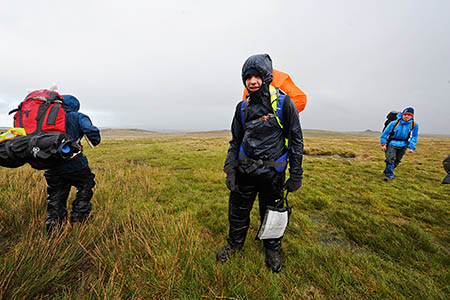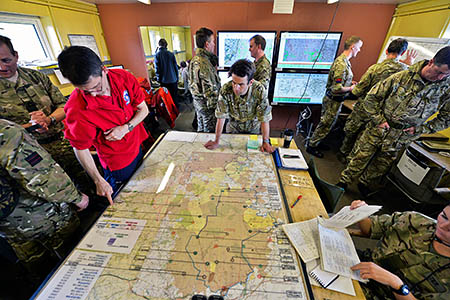Thousands of participants in the Ten Tors challenge had to battle strong winds and sub-zero temperatures over the weekend.
But the Army, which organises the annual test of teenagers’ stamina and navigation skills, said more than 80 per cent of youngsters who started completed the course.
The event is open to schools and youth groups in the South-West of England and more than 2,000 14- to 19-year-olds started the trek across Dartmoor, trying to complete 35, 45 or 55 miles of some of the toughest terrain and highest peaks in Southern England relying on their navigational skills and carrying all their food, water, bedding, tents and other essentials as they went.
Brigadier Piers Hankinson, who was in charge of the event, said: “It’s great they do this.”
Speaking at the end of the event, he said: “Last night was really tough: –1C, –2C, with a chill factor. Very strong winds, 40 to 50mph, tough conditions.”
The organisers, who also use the event as a civil contingency exercise, altered the course for the first time in years.
Brigadier Hankinson said: “We have changed the route. We are slightly hostage to weather, necessarily so in certain places, particularly so with rising water levels. If the water rises it actually puts the whole challenge at risk.”
The new route also avoided roads which have become increasingly busy.
Even the military personnel struggled with conditions on the tors.
Major Stuart Keegan, in charge of the ‘fallout cells’ said they had to battle with the elements.
The soldiers deal with competitors who have to drop out of the event.
He said he had troops in three positions on Dartmoor. “The guys at Oakland Hill especially are dealing with some very interesting weather.
“They have only got one Porta Potty still standing. All the others have fallen over and they are hanging on tight to their tent.”
First team across the finish line was from Churchers College in Hampshire.
Team members said: “It is a bit of a shock really. We woke up hoping to win the school record, and then we came home first.
“We got off to a pretty good start and ever since we started it went pretty well. Luckily our navigators didn’t get us lost.
“The weather was pretty awful. There were points when we were just walking up and suddenly the rain would start and the wind as well.
“It is difficult to keep yourself on the side of a tor when it is really windy. We pretty much walked into the wind the whole thing.”
The Army also used a GPS tracking system to keep tabs on the participants for the first time this year.
Military staff and reservists worked with Devon and Cornwall Police and specialist organisations including Dartmoor Search and Rescue Group and more than 70 West Country-based volunteers from the British Red Cross who provided medical cover for participants and spectators over the Ten Tors weekend.
The organisers also stage the Jubilee Challenge over shorter courses for young people with special physical and educational needs.
The Army, as Ten Tors organisers, said it also worked closely throughout the year and over the weekend with the Dartmoor National Park Authority, landowners and commoners to minimise the environmental impact of the event and the associated training and to maximise the local economic benefits of Ten Tors.


Ian Barber
13 May 2014For the sake of accuracy, Major Keegan had troops stationed on Okement Hill (SX 602 878) - not Oakland Hill. Okement Hill is the location of Observation Post 15, a concrete bunker located on the military 'ring-road', some 4 miles South of the Okehampton Camp where Ten Tors is based.
The environmental impact of the event is highly questionable. So long as the purpose of the exercise was to produce 20-or-so various 35, 45 and 55 mile routes with no road or river crossings (to avoid risk of litigation). The involvement of the DNPA, landowners and commoners was irrelevant. People who know Dartmoor will know that two roads dissect the moor, and many rivers originate there also.
Drift Lane - a narrow bridleway which runs from the moor down the West bank of the West Dart River into Postbridge is now a quagmire. This, as all teams were funnelled down here to the checkpoint, across the bridge, then up the similarly treacherous East bank path back on to the moor. Whilst I share the military's joy that there were no serious injuries in this year's event, I hope that next year a better balance can be struck between Environmental impact and Health & Safety.
Neil Abbott
13 May 2014There is just no getting away from how important this event is in the hearts and mind of the students and volunteer staff of so many establishments in the south west. That the event continues is incredibly important.
There is however no getting away from the fact that the changes have centralised a lot of erosion in the areas where multiple routes overlap. These points have been created by the organisers looking to avoid the unsupervised crossing of the larger more flashy rivers on the high moor. However the changes are also linked to the forthcoming loss of the Sea King SAR capability.
The event used to be spread over a far greater area including the south moor. Centring it solely on the north more reduces the need for air cover over the coming years but has led to the erosion issue. There is no easy way forward for the event in times of falling budgets.
Additionally please note that Ten Tors is not and has never been a race. Please try to get away from the race mentality on this one occasion. It is an endurance challenge with the primary aim being to complete as a team and should be reported as such. It would be worth checking whether your "winners" finished as a six or just dropped their slowest member.
Bob
13 May 2014I've re-read our story and failed to find any reference to a race.
The team from Churchers College was described as the 'first to cross the line'.
One of their members, in an Army-conducted interview, talked about 'winning his school record'. That is a direct quote and refers, I believe, to beating his own institution's best time.
The story consitently refers to the Ten Tors as an event or challenge.
Bob Smith
Editor
Neil Abbott
13 May 2014Semantics Bob. There is no space given to the comments of those students who came in at 5:58 helping and cajoling their friends along the way or the students who came in singing and bounding along in fancy dress throughout the day. There is also a mere line about the jubilee challenge and certainly no interview or quote. I'm not anti racing, it has it's place in life, only this isn't that place. Whilst you don't call it a race you glorify first finishers in a way that is contrary to the spirit in which the event takes place.
Additionally please don't use the cop out that it was an army interview. If it's not worth quoting then don't quote it.